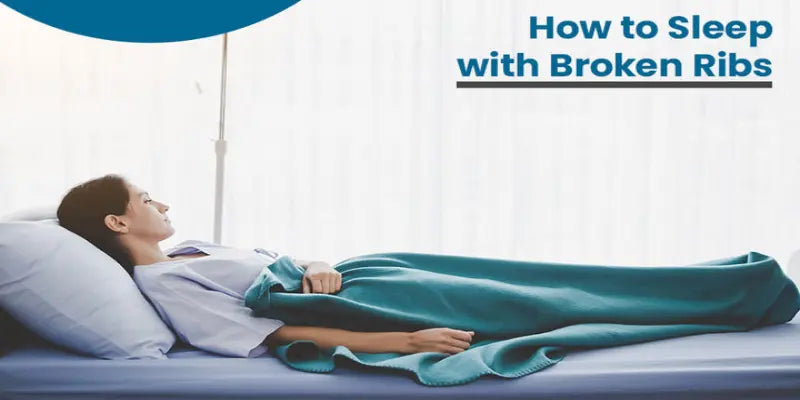
How to Sleep with Broken Ribs?
Many people are happy to fall asleep and not have to worry about their sleep position. However, there are many people that suffer from conditions like broken ribs or a punctured spleen and can't change their usual sleeping positions. This article will tell you how to sleep with broken ribs and what your pillow can do to help!
What is a Broken Rib?
If you have broken your rib, you will likely experience significant pain. This pain can be exacerbated by any activity that puts pressure on the broken bone, such as coughing, sneezing, or laughing. To sleep with a broken rib, it is important to follow these tips:
Avoid putting any weight on the affected side. This means avoiding sleeping on your back and avoiding activities that put pressure on the chest, like heavy lifting.
Use a pillow to prop up your head and chest. This will help to decrease the amount of pressure applied to the broken bone.
Take ibuprofen or acetaminophen before bed if you experience pain from the broken ribs. These medications can help to dull the pain and reduce inflammation.
How to Sleep with Broken Ribs?

If you're like most people, you probably know that sleeping with a broken rib can cause a lot of pain. But this is the best way to sleep with broken ribs without much pain. The following tips will help you get the most rest possible:
- Make sure the bed is comfortable: If your bed is too hard, you'll likely find it difficult to sleep on your side or stomach. On the other hand, if your bed is too soft, you'll constantly bounce and move around which will cause more pain. Find a middle ground that's comfortable for both you and your rib injury.
- Use a pillow for support: A pillow can help distribute your weight evenly and reduce the amount of pressure on your injured rib cage. Make sure the pillow is big enough so that it covers both your breast and your stomach (but not so big that it's uncomfortable). Try using pillows from Sleepsia. They are highly preferred by a lot of people.
- Take ibuprofen before bedtime: Ibuprofen can relieve pain and reduce inflammation in the body, which can make it easier to heal injuries such as a broken rib. However, be aware that ibuprofen can also have side effects such as drowsiness or light headedness so take it only as directed by your doctor.
- Limit your movement: If you're able to move around, do so as minimally as possible to help reduce the amount of pressure on your injured rib.
- Make sure you drink plenty of fluids: Not drinking enough water can lead to dehydration and worsen your injury.
The Importance of a Good Wedge Pillow

One of the most common injuries sustained during sleep is a broken rib. Ribs can easily be bruised, compressed, or punctured and can cause significant pain when lying on your side or stomach. In order to help minimize the discomfort and allow for a good night’s sleep, it is important to find a pillow that properly aligns your spine. A good wedge pillow will also support your ribs, head and neck, which can reduce pressure on your injured ribs.
If you are suffering from broken ribs, it is important to seek medical attention as soon as possible. In many cases, the injury can be treated at home with rest and ice packs. If the ribs are fractured, however, surgery may be required in order to correct the problem. If you experience significant pain when sleeping due to a broken rib, it is recommended that you seek out professional assistance. A good pillow can make all the difference in terms of comfort and healing time.
Also Read:- Fatigue: Causes, Diagnosis & Treatment
Possible Causes of Broken Ribs, and How to Prevent Them?
Broken ribs are a common injury, and can result from falls, car accidents, or even being slammed against something. If you’re experiencing pain in your chest or side, it’s important to see a doctor as soon as possible.
There are a few things you can do to prevent broken ribs:
- Stay safe when doing activities that could cause you to fall: avoid dangerous heights, don’t drink and drive, and use safety gear when participating in sports.
- Avoid getting injured in the first place: be careful when walking around your house, stay alert while driving, and use caution when lifting heavy objects.
- If you do break a rib, don’t try to self-fix it: go see a doctor right away. There are many treatments available for broken ribs, including medication and surgery.
The Different Types of Broken Ribs
A broken rib is a common injury that can occur during physical activity, such as running and lifting. Broken ribs can cause pain and limited movement. Ribs may also bruise easily, making them difficult to see. In some cases, a broken rib may puncture the lung or other internal organs. If left untreated, a broken rib may require surgery to repair the injury.
There are three types of broken ribs: compressed, displaced, and cracked. A compressed rib is the most common type and is caused by pressure on the chest bone from another body part or object, such as a fall or collision. Displaced ribs occur when one side of the chest wall pops out of its socket (the cartilage that connects it to the spine). Cracked ribs are less common but are caused when pieces of bone break off inside the chest wall.
The different types of broken ribs have different risks associated with them. A displaced rib may puncture the lungs if it lodges in between them while breathing, while a cracked rib may cause fluid to accumulate within the chest cavity and lead to pneumonia. Compressed ribs tend to heal without requiring surgery, but people with displaced ribs or cracked ribs should consult with a doctor because they may require additional treatment, such as painkillers and breathing exercises.
Potential Risks Associated with a Broken Rib
There are a few potential risks associated with a broken rib. These include difficulty breathing, coughing, chest pain and infection. Broken ribs can also lead to deformity in the ribcage. To reduce these risks, it is important to take care when sleeping with a broken rib.
To sleep comfortably with a broken rib, use a pillow that is specifically designed for this purpose. This will help to support the ribcage and reduce pain and discomfort. Additionally, make sure to avoid heavy lifting or activity while your ribs are still healing. In most cases, soreness and swelling will go away within six weeks after the injury occurred.

The Risk Factors for Breaking a Rib?
There are many potential risks associated with a broken rib. These can include pain, difficulty breathing, and even pneumonia. The most common cause of a broken rib is when someone falls on their side or rear end and ribs hit the ground. Other causes include slips and falls, blows to the chest, and car accidents.
The risk of breaking a rib increases with age. Adults are more likely to break a rib than children, and people over 75 are five times as likely to fracture a rib as those under 25. People who have arthritis or other conditions that make it difficult to breathe also increase their risk of breaking a rib.
People who smoke are also at an increased risk of breaking a rib. This is because smoking raises your blood pressure, which can make it harder for your lungs to take in air and protect your chest from injuries.
How to Increase Comfort when Sleeping with Broken Ribs?

If you have broken ribs, it can be difficult to sleep comfortably. Here are some tips to help increase your comfort:
- Bring a soft pillow and a sleeping bag: Place the pillow between your knees and the sleeping bag on top of it. This will create more space for your lungs and help reduce pain from broken ribs.
- Wear a Bra with Straps: Many women find that wearing a bra with straps helps distribute their weight more evenly which in turn reduces pain. If possible, try to sleep on your back to reduce pressure on your broken ribs.
- Limit Airflow: Clear any obstruction from around your bed such as excess clothing, furniture or blankets. This will allow air to flow freely around you which can reduce congestion and swelling.
- Applying Heat: Heat can also help relieve pain and inflammation. Apply heat using heating pads, warm water bottles or microwaveable containers placed on the area surrounding your chest.
- Avoid Hot Spots: Avoid hot spots by keeping the area around you cool and moist.
- Cold Spots: Cold spots are caused when blood pools in the area below the ribcage due to restricted airflow. To avoid cold spots, place a wet cloth over the affected area or wear loose-fitting clothes that allow air to circulate freely throughout the body.
- Drink Plenty of Fluids: Drink plenty of fluids to help reduce the swelling and pain caused by broken ribs. This includes water, juice, soups and broths.
- Eat a Balanced Diet: Eat a balanced diet to help improve your overall health and reduce the amount of inflammation you are experiencing. This includes lots of fruits, vegetables and whole grains.








